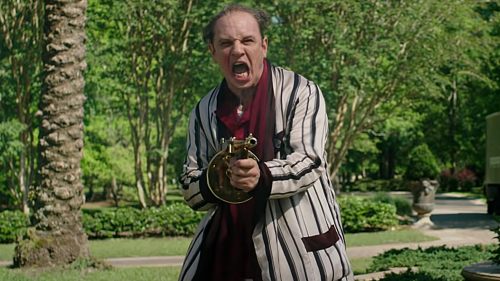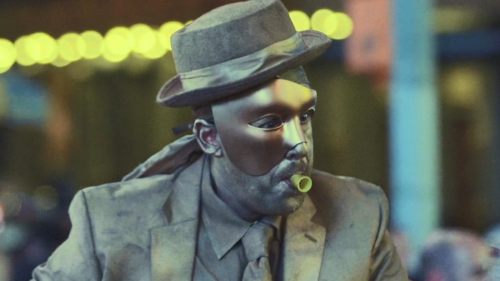TIFF Review 2019: UNCUT GEMS Is A Raw, Demented Masterpiece
Though it may be a film that lives and breathes New York, in one brief scene Uncut Gems opens itself up to far-reaching implications, with scenes of injured workers in the Welo mines in Ethiopia. The latest film from Josh and Benny Safdie operates in a similar fashion to Good Time’s underlying commentary on white privilege; this opening scene in Ethiopia is essential to the tone of the rest of the film, one ultimately about a man destroying himself in order to maximize a profit that he’s made off of endangered, underpaid Africans through an unholy combination of betting, pawnshops, and other precarious methods.
The man in question is Howard Ratner (Adam Sandler in a career-best performance), a jeweler located in New York’s diamond district who is up to his neck in debt, constantly dodging or fighting off terrifying collectors. To clear his debt, and maybe even become a millionaire in the process, Howard has imported a precious black opal (an uncut gem!), a hypnotic rock in which “you can see the universe”, taken from the aforementioned Ethiopian mines, planning to order to auction it off in the next week.
Decked out all in Gucci, from his glasses to his loafers, Sandler gleams as Howard. He’s the latest version of the grimy Safdie brothers grifter, a pathetic, self-destructive ball of nerves and barely-concealed rage operating on a short fuse. The actor’s usual mixture of charming dopiness and simmering rage haven’t married this well to a character he’s played since Punch Drunk Love - never less than compelling to watch in every moment, eliciting sympathy even as he makes increasingly infuriating choices. Sandler also gets to bounce off an eclectic, volatile cast; the film mixes unexpected faces such as Idina Menzel as Howard’s long-suffering wife, LaKeith Stanfield as his frustrated business partner, as well as The Weeknd and Kevin Garrett playing funhouse mirror versions of themselves.
It’s also a film steeped in Jewish culture, examining in stops and starts both familial bonds as well as the relationship between different parts of the diaspora (Howard learns of the black opal through researching Ethiopian Jews). Another dominant force driving the film is basketball, populated with various scenes of Sandler obsessing over team memorabilia or screaming about the Celtics. With Kevin Garnett practically in a starring role (in what must be the best ever film performance by a basketball player), and a late film sequence that might be the most demented simulation of what it feels like to have intense emotional stakes in the outcome of a game, Uncut Gems slots into a very particular niche, and it’s all the better for it.
No matter how tense or unpleasant the narrative gets, it’s purely hypnotic filmmaking from the start, beginning with a vivid, kaleidoscopic CGI ‘Journey Through the Gem’. Darius Khondji’s elegant cinematography emulates some of the claustrophobic zooms and other quirks of the Safdie’s previous collaborator Sean Price Williams, amplifying the tension of Sandler’s Howard constantly trying to keep his head above water while surrounded by loan sharks. Daniel Lopatin, better known as Oneohtrix Point Never, once again proves a perfect collaborator after his immense work on Good Time, building wonderful soundscape with humming bass and piercing synths, at points recalling Geinoh Yamashirogumi’s Akira soundtrack with loud, harsh drums. The score works in devastating combination with some utterly distressing sound design, conversations overlapping until they’re just utter noise.
It feels like a culmination of every film the Safdie Brothers have made to date, mixing the family drama of Daddy Longlegs with the frenetic tightrope act of Good Time and lead character Connie Nikas’ various cons. Like Good Time, Uncut Gems is an exercise in utterly torturous suspense, as Howard’s various cons and precarious schemes continually fall apart around him. It’s a rich, enthralling and utterly demented experience, and a continuation of the Safdies’ fascination with New York’s underbelly, here examining the vices and failures of the rich and those who would desperately seek to join them.



